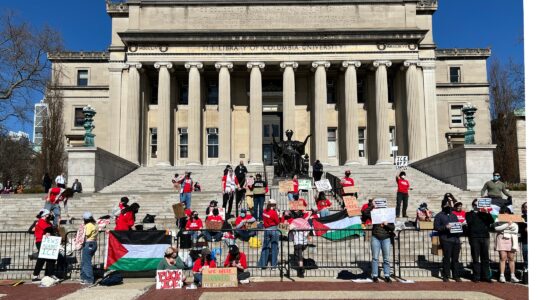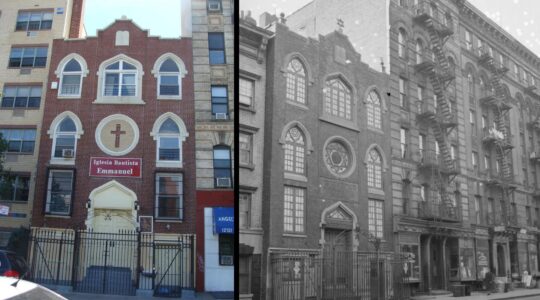Shvut Rachel, West Bank — When Yaakov Teitel first applied to join this West Bank settlement about a decade ago, the American Jewish immigrant passed the admissions committee with flying colors.
The bachelor computer technician impressed Shvut Rachel’s leaders as a “mensch” with a love of the Land of Israel who was looking to settle down and start a family, said committee member Rabbi Baruch Barron.
But after security authorities said this week that Teitel is suspected of multiple terrorist acts, Shvut Rachel’s current admissions director acknowledged that the case would resonate when reviewing future candidates.
“I think the next couple I meet, that association will definitely come up,
Residents here say they were shocked by allegations that Teitel murdered two Palestinians in 1997 and attempted to bomb a prominent left-wing political science professor and a messianic Jewish family from the settlement of Ariel. Police are also investigating his involvement with the shooting attack in August on a Tel Aviv gay youth center, as well as several unsolved killings of Palestinians.
Coming just days before Israel marks the Gregorian calendar anniversary of the assassination of Prime Minister Yitzchak Rabin, the publication of the case has reawakened concerns about the potential of political terrorism to derail negotiations.
“Tough decisions are right around the corner. With [President Barack] Obama’s pressure to move to toward negotiations, Israeli Prime Minister Benjamin Netanyahu is liable to make unpopular decisions,” said Hebrew University professor Yaron Ezrahi.
“This is a reminder of the need to deal with these people and not to allow them to threaten decision makers.”
The arrest is also stirring tension between the political left and the nationalist religious public at the core of the settlement movement over whether they share any collective guilt for the action of an individual.
Teitel is already being mentioned in the same breath with infamous Jewish terrorists like Baruch Goldstein, who killed dozens of Muslim worshippers in the Tomb of the Patriarchs mosque in 1994, and Natan Eden Zada, who went on a shooting spree on a bus in an Israeli Arab town weeks before Israel’s withdrawal from Gaza.
The son of a fervently Orthodox navy dentist, Teitel grew up in Florida and Virginia. He is believed to have linked up with the hilltop settler activists, considered to be the most extreme in the settler camp, in the 1990s when he came to Israel as a tourist. That’s also when he allegedly murdered two Palestinians.
Teitel returned three years later, and was accepted to Shvut Rachel. Only in about 2006 did he apparently return to bomb making.
A lawyer for Teitel has said that his client is mentally unstable.
Late Sunday, Israeli Prime Minister Benjamin Netanyahu said in a statement that Israel must fight a “marginal minority” of extreme nationalists threatening Israel’s democracy.
With the latest case splashed across the front pages of all three major Israeli dailies, settlers are worried about the fallout and have been quick to distance themselves from Teitel.
“If the allegations are true, it was the action of a private person. It has nothing to do with the larger community,” said Meir Eshkoli, a yeshiva student from Shilo, a settlement just one hilltop away from Shvut Rachel.
Asked if local residents would have reported Teitel if they knew of his activities, Eshkoli balked. Not necessarily, he said. “Today, there is no faith in the police that it will do justice.”
Shvut Rachel is a tiny community of several hundred residents on a wind-battered hilltop about 15 miles north of Jerusalem. It is situated off Route 60, the winding north-south backbone that strings together Palestinian villages, settlements and hilltop outposts.
The highway and access roads to Shvut Rachel have been plastered with posters advertising a memorial for Rabbi Meir Kahane, who pushed for the expulsion of Arabs from Israel and the West Bank. “Today, everyone knows,” the poster reads, “Kahane was right.”
Though it was established in the early 1990s, the settlement has remained small. Unlike most settlements, there’s not even a convenience store.
Three years ago, another settlement resident, Asher Weisgan, murdered five Palestinian co-workers and was given consecutive life sentences.
On the defensive from questions about how Teitel’s activities and political believes could have been unknown in such a small community, residents have assiduously portrayed Teitel as an aberration who was not part of the settlement’s community. Despite exchanging pleasantries with neighbors and leaving the impression of a soft-spoken, even “gentle” man, residents said that he was introverted and his Hebrew comprehension was weak.
“It’s hard to accept that someone who has the face of a quiet individual could have a different face,” said settlement resident Dorit Hameiri. When asked how she feels about residents of Shvut Rachel being described as terrorists, she shifted uncomfortably. “I don’t know what that word means. They say ‘Jewish terrorist’ but that annoys us because this isn’t Judaism.”
Rabbi Barron, the settlement admissions committee member, asserted that Shvut Rachel has become more discerning about filtering out residents of the outposts because “this settlement is not hilltop.” These days the committee tries to look for extremist political statements against the government, he said.
That’s a switch from the period when Teitel was first accepted to live in the settlement. Rabbi Barron said that despite the Baruch Goldstein attack, residents were not looking for signs of an extremist.
“We had no experience at the time with someone who would be an exception to the rule,” he said. “We weren’t aware of the complexities.”
Police officials said that Teitel kept several weapons buried in his backyard while he allegedly worked on bombs in the office he used in his work as a computer consultant.
Settlement residents argued that if Teitel could evade a police investigation for 10 years, there’s no way they could know what he was up to.
Indeed, the case has raised a number of questions about the effectiveness of the division of the Shin Bet security services that deals with Jewish crime. Many commentators faulted security services for lacking the intelligence necessary to solve cases. Others pointed to his arrest and release back in 2000 as a cardinal flaw.
“For seven years he plotted and blew up bombs, and again — unhindered,” wrote Yoav Limor in the newspaper Yisrael Hayom. “Nobody wondered why he was buying fertilizer, nobody around him wondered what he was cooking in his room, a number of police investigative teams separately checked parallel cases without connecting the dots and turning them into one clear, incriminating line.”
Once again, Israeli leftists pointed to political and religious leaders on the right as indirectly responsible for not exercising enough restraint over their followers.
“Obviously the leaders of the right don’t want to see these kinds of things,” said Ezrahi, “but they don’t do much to restrain the rabbis who condone it.”
Back at Shvut Rachel, Teitel’s sister-in-law, Sara Avitan, recalled the day last month when security officers awakened her family, then searched through her house. Only in the subsequent days did she find out why Teitel had been arrested.
“I find it difficult to believe and understand how two different personalities existed in the same person,” said Avitan, who added that Teitel’s family would not talk to the press. “This is not the way we educate our children.”
Avitan also struggled with the label of terrorist. “If it’s true? He probably is. I think the term would be … I don’t know how to finish the sentence.”
The New York Jewish Week brings you the stories behind the headlines, keeping you connected to Jewish life in New York. Help sustain the reporting you trust by donating today.




